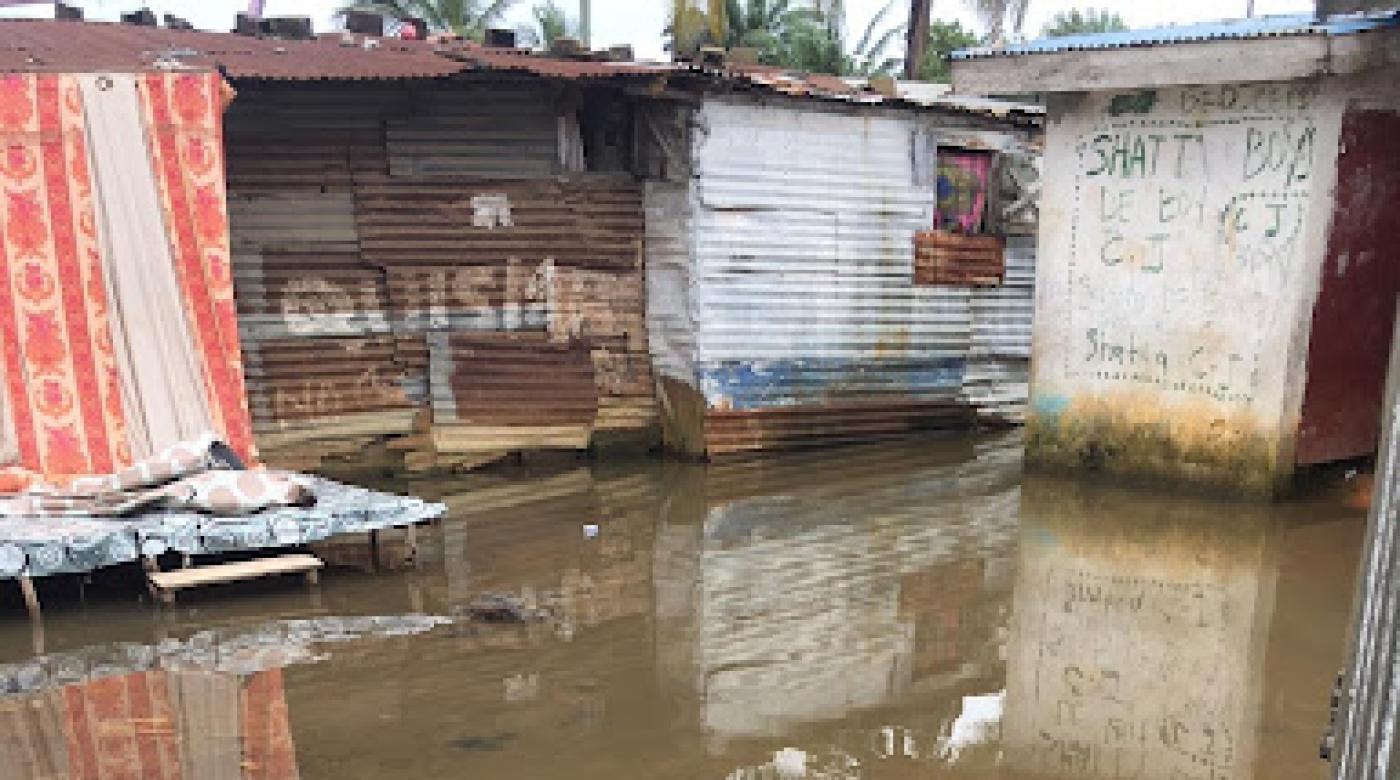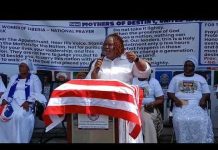Africa-Press – Liberia. We are in fear. How do we manage in this rainy season? When it rains we can’t go out. Our homes get full of water and the entire community. We are so worried,” said Doris Kettor, a mother of four.
Life has not been easy for Doris Kettor in Doe Community, one of the country’s largest slums, as she grapples with increased criminal activities, difficult access to safe drinking water, and the offensive odor of open defecation.
But heavy torrential rains have made matters worse for the 53-year-old, who is a mother of four and a widow. The rain resulted in damage of L$60,000 (US$400) worth of goods rendering Kettor, who had used her last savings to invest in a small provision shop, without any source of income.
“We are in fear. How do we manage in this rainy season? When it rains we cannot go out. Our homes get full of water as well as the entire community. What are our options during this wet season?” she wonders. “Whenever it rains, water fills up all of our homes and the neighborhood. We are losing a lot.”
“I lost my mattress, my phone, an ice box, and two bags of 25kg rice to the water that entered my house last week,” Jessica Pah, another flood victim, laments. “We were sleeping and woke up in the water. We are suffering and looking at the rain, how are we going to manage?”
According to the UN Refugee Agency, weather-related disasters drive millions of people from their homes each year, and 70 percent of those who are internally displaced due to war come from nations that are among the most vulnerable to climate change.
Communities that have been forcibly displaced and are living in climate-vulnerable regions are threatened with losing their lives and means of subsistence. The cycles of disaster and displacement will continue and get worse if we don’t get enough assistance to adapt. Doe Community is not exempted from this effect. Its residents are already feeling the harshest effects of floods due to a lack of mitigating resources and a reduced ability to adapt to a more hostile environment.
The majority of its residents are unemployed or earn very little money. Most claim that if they could make a life somewhere else, they would leave. Many came here during the conflict, and more have subsequently arrived as Liberia’s urban and peri-urban populations rapidly increase.
“Since they lost their homes, and everything in it, the majority of the flood victims are homeless and are staying with families and relatives in nearby places,” said Terry Nimely, a representative for the Doe Community Youth Association.
“The rain fell while they were asleep. All of the zinc dwellings then became inundated,” he says. “Therefore, we are pleading with the government and other charitable organizations to assist the Doe Community’s members, some of whom lack a place to sleep and have left the community.”
He added that pregnant women and nursing mothers were seriously harmed by the flood as clinics remained closed, preventing patients from accessing medical care. Nimely claims that because of the impending rainy season and the Doe community’s slum setting, they are most concerned about becoming homeless before September, October, or November.
Abayomi Grant, Waste Management Officer at the Environmental Protection Agency, added that “All communities are faced with water and sanitation problems, not only slum dwellers.”
“As you can see, the streets are littered with waste. You see people littering the streets with plastic bags, the marketplaces are all filled.”
Doe Community, like many slums in Monrovia, suffers from subpar housing and sanitation. According to a Cities Alliance assessment, slum dwellers make up nearly 70% of the population of Monrovia and its surroundings, due to the city’s explosive growth after the end of the conflict in 2003.
Samuel Kanyon Doe, a former president, inaugurated the neighborhood in 1986. They are overpopulated with many people squeezed into small rooms built without any urban planning or adherence to zoning regulations. In these communities, only a few people burn garbage but the vast majority dump it along the riverbank and use the river as a latrine. Those whose homes have toilets end up running their sewage in the river or use makeshift toilets.
Joseph Saah, in Clara Town, Riverview chairperson, also shared the same predicament with Doe Community. The flood left people homeless and deprived of their possessions. Clara Town is another slum in Monrovia that is battling flooding. And it also lacks a concrete housing structure and not enough drainage. People also use the riverbank for trash disposal and toilets.
Open defecation is a common practice. Others use makeshift toilets and public latrines. It pollutes the environment and affects water sources from hand pumps, wells, rivers, and waterways.
Malaria is a leading cause of illness and death in Liberia, accounting for 46.9% percent of hospital outpatients in 2020, according to the World Health Organization. Diseases such as dysentery and typhoid are widespread. Diarrhea affects more children under 5 in Liberia than anywhere in the world.
Last year, world leaders including President George Weah assembled the UN 26th Conference on Climate Change (COP 26) in Glasgow, Scotland. Weah told his fellow leaders that there was an inherent imbalance in the current architecture of climate financing. He said although Liberia bears the brunt of the impact of climate change, the country benefits the least from the existing solutions and financial arrangements currently in place for tackling climate change.
For More News And Analysis About Liberia Follow Africa-Press










